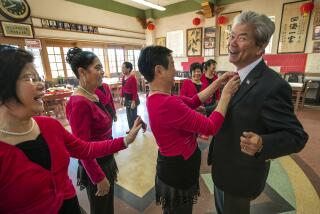A Fami-Lee Reunion for the Millennium
- Share via
BOSTON — Imagine a family with almost 100 million members worldwide. Lined up side by side for a family photo, the relatives would stretch around the world one and a half times.
The Lee family--or Li, depending on how you transliterate it from Chinese--is so big it even has its own credit union, worth $22 million. It is considered taboo for a Lee to marry another Lee.
“Technically speaking, when you’re married to a Lee, you’re not expanding. You’re downsizing. You have to bring other surnames into the flock,” said Yon Lee, one of nearly 500 Lees here recently for the family’s last mass reunion before the millennium.
Downsizing doesn’t appear to be a problem.
Lee recently edged out Chang (or Zhang) as the largest surname in China and, therefore, the world. There are about 100,000 Lees in the United States alone.
Lees at the reunion represented more than 20 chapters of the Lee Family Assn. from the United States, Canada, Hong Kong, Taiwan and China. Yon Lee is English secretary of the Lee Family Assn. of New England.
The Lees are serious about their claim of relatedness. They say they are all descended from the ancient Chinese philosopher Lao Tzu, founder of Taoism, who lived 2,500 years ago.
A figurine of Lao Tzu sits atop the Lee Family Temple in Boston’s Chinatown. Lees pay as much as $3,000 to have tablets of their deceased ancestors placed in the temple.
But prolific mating is not behind the exorbitant number of Lees.
Steven Lee, grand national president of the association, traces the explosive growth of the family back about 1,300 years to the Tang dynasty, when an emperor named Lee bestowed his surname upon favored subjects.
“At that time, it was an honor to be a Lee,” Steven Lee said. “The emperor said, ‘If you’re loyal to me, good soldier, I give you the last name Lee.’ ”
The family association itself dates back to the 1800s, when Chinese arrived in the United States to work on the transcontinental railroad. In a hostile foreign environment, Chinese of similar backgrounds or surnames formed social support organizations.
“The family association acted like an extended family,” said Wilson Lee, president of the New England chapter.
The associations provided emigrants with everything from food to shelter to medical treatment. If a Lee died, they would arrange to have the remains sent home.
Nowadays, the associations may also play a role in the political future of Chinese-Americans. In fact, the highest-ranking Asian-American in the Clinton administration is civil rights chief Bill Lann Lee.
In Asia, Lees wield even more political clout. There’s Lee Teng-Hui, president of Taiwan; Li Peng, former premier of China; and Lee Kuan-Yew, former prime minister of Singapore.
And in an age when many Chinese-Americans are losing touch with their heritage, the family associations are trying to avoid extinction by reinventing themselves with rank-and-file Lees.
“What can we offer the young people?” said Wilson Lee, who hopes to succeed Steven Lee as grand national president.
One of his ideas is to establish a host family program in which young high school-age Lees visiting colleges could stay with another Lee family.
“We can still serve the purpose of an extended family,” he said. “We can offer them a home away from home.”
More to Read
Sign up for Essential California
The most important California stories and recommendations in your inbox every morning.
You may occasionally receive promotional content from the Los Angeles Times.











